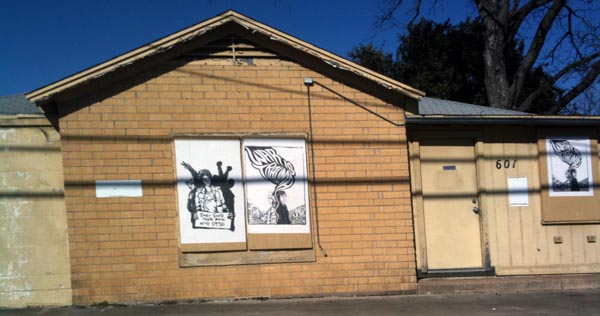 |
Veterans and GIs Organizing at Fort HoodBy Siri MargerinFort Hood, Texas — The buses are heading to the airport again. They are carrying members of the First Cavalry Division off to the start of a new deployment in either Iraq or Afghanistan, making it their 4th deployment since 2003. For many of the individual soldiers, this makes their 3rd or 4th deployment or more in the War on Terror. As the buses roll by, a small cluster of veterans and active duty service members stand outside, passing out information and starting conversations with passersby. These folks are part of a new stage in Iraq Veterans Against the War's Operation Recovery campaign and have come to Ft. Hood to do outreach with soldiers on base. "This kind of outreach is the hardest thing to do," one of the IVAW members said, "It's really difficult to ask these loaded questions of strangers. But, it's exciting too! This is where we build real empowerment and change. How many of these folks don't realize that they have the right to ask for better treatment, now, while they are still in service and being deployed." Yesterday afternoon the temperature dropped to below freezing. A young specialist and his wife stopped by to listen to IVAW members make their case: "Are you interested in making a pledge to help stop the deployment of traumatized troops? Right now approximately 20% of the soldiers deploying are dealing with some combination of MST, PTSD, and/or TBI. Are you familiar with these issues? "Yeah I am... I know two guys deploying with me tonight who are dealing with PTSD." "Are they receiving help?" "Well... the command has other priorities..." The overwhelming majority of those asked are unfazed by the questions: yes, they reply, something should be done. People on base are all-too-familiar with the consequences of trauma. Last year, there were 22 confirmed suicides at Ft Hood — twice as many as 2009. The base has been experiencing an epidemic of suicides: during one tragic weekend in September of 2010, four soldiers took their own lives. 2011 has not started off any differently: on January 13th, a veteran of the 1st Cavalry named Justin Languis went out to the division's Operation Iraqi Freedom Memorial and (apparently) shot and killed himself. His wife remains an active duty soldier at Ft. Hood. The suicides are only the tip of the iceberg. Military Sexual Trauma (MST) and Traumatic Brain Injury (TBI) are widespread, but grossly under reported. Post-Traumatic Stress Disorder (PTSD) is more routinely diagnosed, but treated either ineffectively or not at all. The wounds from these traumas are wreaking havoc in the lives of soldiers, their families and their communities across the United States. Despite the Department of Defense's directive against deploying service members who are not "medically able to accomplish their duties in deployed environments," these troops are being sent back into combat with shocking regularity. Troops return home with multiple accumulated traumas. In these cases, the odds of suicide attempts increase dramatically, as do the odds of drug and alcohol abuse, divorce, depression and various kinds of out-of-control behavior. None of this is news to the folks at Fort Hood. Last spring, three military spouses desperate to help their husbands were driven to public action. Their husbands were all already diagnosed with PTSD. Their command was ignoring their conditions and failing to treat them in accordance with the directives of their military medical profiles. The profiles stated that these men were not to be exposed to weapons, war training, or war simulation of any kind. yet in direct contravention of those instructions, they were sent to National Training Center (NTC) for simulated war training. With the help and support of folks, such as Cindy Thomas, the founder and manager of Under the Hood Café and Outreach Center (the GI coffee house located in Killeen outside Ft. Hood), the women faced down military pressure and ultimately secured proper care for their husbands. Cindy herself was experienced and ready to help: her soon-to-be former husband of eighteen years was diagnosed with TBI and PTSD after serving multiple deployments. Their marriage was happy and stable before collapsing under the weight of military trauma. Aaron Hughes, a field organizer for IVAW out of Chicago is one of the folks getting the pledges signed outside the PX; both he and Cindy Thomas took part in an IVAW/Civilian-Soldier Alliance campaign development retreat in June 2010. This event occurred right in the middle of the struggle between the spouses and their husbands' commanders, and Cindy shared that story, as well as others collected from the many active duty soldiers and family members she supports at the Café. That testimony helped to develop the campaign. Now, seven months later, the campaign has found its legs and returned to Ft. Hood. "We need to listen to the stories of those who are on the ground and let them guide us," Aaron Hughes argues, "This isn't about rhetoric. This is about treating our troops like human beings with the right to heal." This is a different way of approaching the issue of ending the wars, through clear-eyed solidarity with those most impacted by trauma, the ones who are expected to fight these wars, along with the people whose countries are being occupied by these troops. "And," he adds, "we have collected over 100 pledges already and are going for 400 before the week is out." Iraq Veterans Against the War, along other veterans and active duty service members, is taking the campaign to the soldiers at Ft. Hood and on to bases across the country. Those outside of the military need to listen hard to the stories being told and consider what it really means to support the troops. Support them in stopping the Deployment of Traumatized Troops. Siri Margerin is a member of the Civilian-Soldier Alliance.
|


